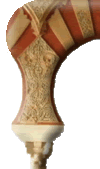

The Move of the Capital to Kufa amid Continuing Unrest 657
After the Battle of the Camel, Caliph Ali رضي الله عنه spent a few days in Basra where he appointed his cousin Abdullah رضي الله عنه [d. 688], the son of Abbasرضي الله عنه the governor of the area. He then entered Kufa (January), a new town in Iraq which had grown out of a military camp established about twenty years earlier, and made it his new capital. Madinah was never to become again the seat of government.
The battle did nothing to help Ali assert his authority and restore badly needed unity in the Muslim world. On the contrary, it damaged his reputation, because the pious were inclined to blame him for the shedding of Muslim blood in this battle, and troubles were simmering everywhere, particularly in Egypt and Syria.
The Battle of Siffin 657
Muawiya ibn Abi Sufyan رضي الله عنه, governor of Syria, being now head of the House of Umayya (to which the murdered Caliph belonged) was another powerful figure who demanded punishment of the assassins. When this was not forthcoming, he refused to pay allegiance to Ali, making his allegiance dependent upon retribution for the murder of Uthman رضي الله عنه. He kept himself neutral in the earlier battle between Ali and his opponents, and had been cleverly waiting for the right opportunity to challenge Ali’s rule openly. In the meantime, however, he had been making propaganda and stirring up emotions against Ali by hanging the blood-stained shirt of Uthman from the pulpit of the Great Mosque of Damascus. The shirt and severed fingers of Naila, Uthman'sرضي الله عنه wife, were smuggled out of Madinah to Damascus soon after the tragic event of his assassination from which the Arab empire, and indeed Islam itself, was never to recover. This grotesque emblem was kept there in case the spirit of vengeance began to subside.
Muawiya, a political genius, had governed Syria very successfully for nearly twenty years and built up a large and loyal army. He negotiated a truce with the Byzantines in return for payment of tribute so that he could be free to move his army into Iraq if and when the need arose. He had also by now a powerful and astute adviser in the person of Amr ibn al-As رضي الله عنه, the conqueror of Egypt, who had been deposed by Uthmanرضي الله عنه but made friends with Muawiya رضي الله عنه.
In the spring, Ali set out north-west through Iraq in an effort to vindicate his authority and engaged Muawiya's رضي الله عنه army along the Syrian frontier at Siffin, a ruined Roman site near the great bend of the Euphrates. The hostile forces faced one another for several months, engaging in no more than skirmishes. The horror of shedding the blood of fellow-Muslims yet again was felt on both sides and the will to fight was not very strong. However, prolonged negotiations for a peaceful settlement failed, and Muslims started fighting Muslims for the second time in their history in the month of July.
As the battle was going in Ali’s favour, the wily Amr suggested to Muawiya رضي الله عنه a ruse which brought the fighting to an inconclusive end. The soldiers of Muawiya's army fixed copies or leaves of the Qur`aan on the points of their lances and raised them aloft as a symbol of their desire to settle the dispute by the Word of God - whatever that meant in practice. Ali, against his better judgement, was forced by the devout Muslims in his army into a ceasefire from a winning position. Thus the miraculous power of the Qur`aan for the Believers brought the battle to an end forthwith, but the underlying dispute remained unresolved.
An agreement was reached to refer the matter to two arbitrators, one from each side, who would decide between the two parties on the basis of the Qur`aanic laws. Muawiya chose Amr as his representative while Ali’s nominee was Abu Musa al-Ashari رضي الله عنه. Abu Musa رضي الله عنه was a veteran soldier and an acknowledged scholar of the Qur`aan, but he had proved himself to be neutral in these civil wars by being earlier dismissed by Ali from the governorship of Kufa for refusing to fight in the Battle of the Camel (656). Thus, although Muawiya chose the best man to look after his interest in the arbitration, the supporters of Ali رضي الله عنه were so convinced that they were right that they insisted on choosing a neutral and pious man from their side. In the meantime, the two armies returned to their bases, Muawiya's to Damascus and Ali's to Kufa, and thus ended the Battle of Siffin without victory for either party.
However, the rights and wrongs of the basic issues involved were to be debated for centuries to come. It caused a breach in Islam which was never to be healed.